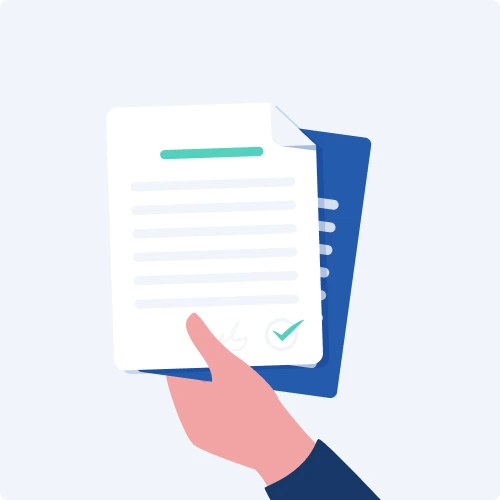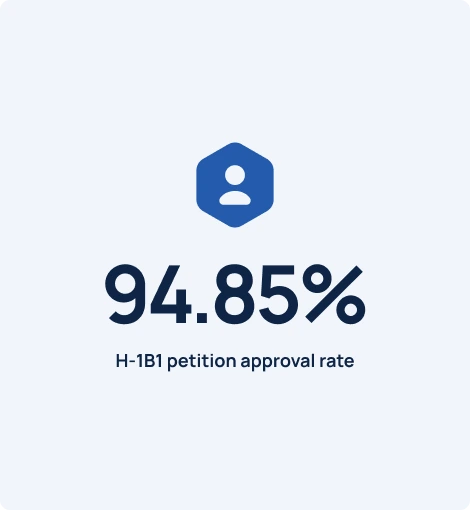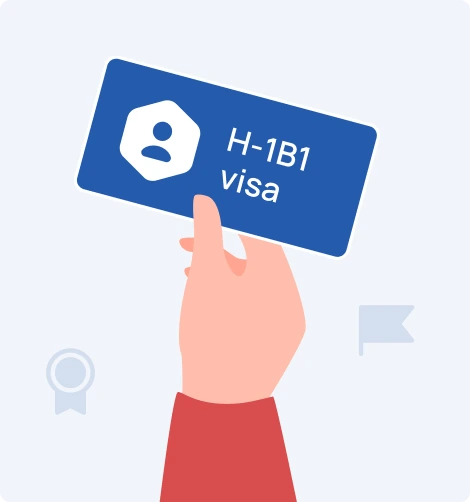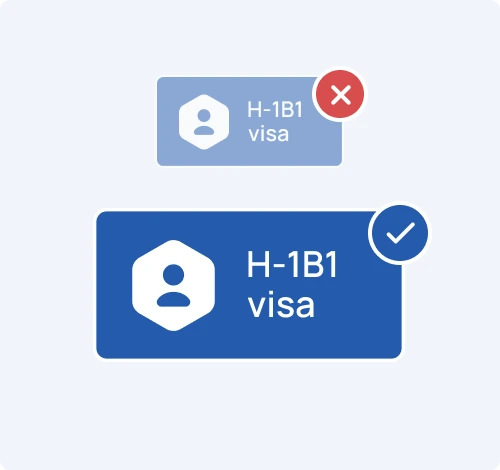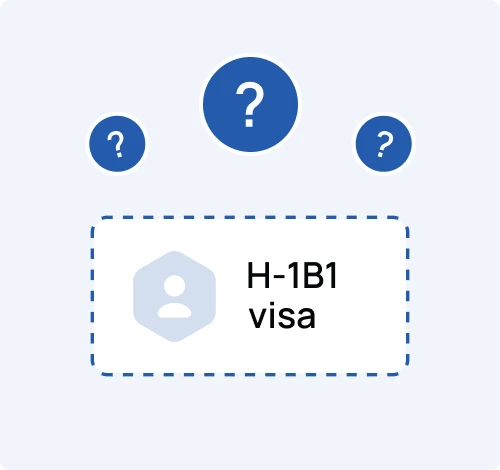

What is an H-1B1 visa?
The H-1B1 Visa is a temporary work visa program in the United States specifically designed for highly skilled foreign national professionals.
This program allows employers in the United States to hire foreign national workers in specialized occupations when there are not enough available American workers.
Benefits of the H-1B1 Visa
The H-1B1 Visa offers several benefits for both employers and
foreign national professionals. Some of the key benefits include:

Secure your opportunity to work in the United States as a highly skilled foreign professional today.

Please note that requirements may vary depending on the employer and specific
regulations of the H-1B1 Visa program.
Education
Have a bachelor’s degree or higher in a specific field of study; either
Experience
Have at least five years of relevant professional experience in the field.
Relevant skills
Candidates must also possess the necessary skills and knowledge for the vacant position.
Temporary work
Coming to the United States temporarily to work in the specialty occupation.
1-Year stay
Do not exceed one year in your stay in the United States with an H-1B1 visa.
Access specialized guidance for your application process today
How to apply for the H-1B1 visa
Updated as of September 2022
USCIS filing and job offer required
To apply for the H-1B1 visa , candidates must file an application with the United States Citizenship and Immigration Services (USCIS).
The application must be accompanied by a valid job offer, as well as other documents that demonstrate that the applicant meets the visa requirements.
Fees and costs
The application fee for the H-1B1 visa is $460, and can be paid online through the USCIS website.
Additional costs may include passport processing fees, as well as travel costs to the US embassy or consulate for the visa interview.
H-1B1 visa requirements
Valid passport
Form DS-160, application for a non-immigrant visa;
Documents proving academic titles and/or professional experience;
Documentation showing that the position is a senior position and cannot be filled by a US citizen;
Valid job offer;
Documents that prove that the applicant will return to their country of origin once their stay in the United States is over.
Once the application has been filed and accepted, USCIS will issue an Alien Registration Card (EAD) to the applicant. The EAD will allow you to legally work in the United States for the time stipulated in the job offer.
You may be required to submit an “Affidavit of Intent to Employ” with your visa application. This declaration is a document in which you and your employer confirm that you intend to work in the United States for the period of time stated in the offer of employment.
Find a job to sponsor your visa
See how we can support your H-1B1 visa process
Advantages and Disadvantages
The main advantages of the H-1B1 visa are:
Advantages
Allows foreign professionals to work temporarily in the United States;
Does not require a permanent job offer to be eligible;
Beneficiaries may request additional extensions if necessary;
Family companions (spouse and children under the age of 21) may travel to the United States with the visa holder
It allows the possibility of accessing a permanent residence (Green Card) in the United States.
Disadvantages
Temporary work for foreign professionals
No permanent job offer required
Extensions available upon request
Non-immigrant visa: return to home country required
No direct path to green card through H-1B1
Limited work opportunities for family companions
How many H-1B1 visas are
granted annually by the
U.S. Citizenship and
immigration and services?
The US Citizenship and Immigration Services (USCIS) awards
65,000 H-1B1 visas annually. However, this figure does not include
visas that are granted to accompanying family members.
Yes, although the number of H-1B1 visas granted each year is limited,
the number does not include visas granted to family companions
Important notice for newlyweds
If at the time of admission to the United States the applicants have
not completed two years of marriage, being the basis for their
immigration status, they will be subject to the clause of article 216 of
the Immigration and Nationality Act. Under this clause, the DHS
officer will grant them a conditional residence upon their
admission to the United States.
You and your spouse must jointly file the petition ( Form I-751 ) with
USCIS to have your conditional status removed.This petition must be
filed within 90 days prior to their second anniversary of the date they
were granted conditional resident status.
If they do not file such an application to remove conditional resident
status during the above period, their status will automatically be
terminated/cancelled and they may be subject to removal from the
United States.
My H-1B1 visa was denied, what do I do?
Request review and appeal process explained
If your visa is denied, you may request a review of the officer’s decision. You will be notified in writing of the reasons for the visa refusal and given the opportunity to present new evidence.
If the denial is upheld even after reconsideration, you may appeal to the Administrative Appeals Tribunal (AAO). These cases are very rare.
Seek immigration lawyer for successful visa application and appeals
At Visa Franchise we recommend obtaining legal and immigration advice from a specialized immigration lawyer before submitting your visa application.
Having a professional will help you both understand the keys to the process and drastically increase the chances of success in your application.
In addition, in exceptional cases of visa refusal, specialized lawyers are the only ones who can file an appeal with the AAO.
What should you expect if your
visa is approved and issued?
EAD for work
If your visa is approved, you will be issued the Alien Registration Card (EAD), which will allow you to legally work in the United States for the time stipulated in the job offer.
Your family will also be able to travel with you to the United States under the same permit.
Visa entry and work deadlines
After receiving the visa, you have 10 days to enter the United States. If you do not do so within this period, the visa will expire and you will need to apply for a new one.
Once inside the United States, you have 90 days to begin working in the position for which your visa was issued. If you do not do so within this period, the visa will expire and you will be considered an undocumented immigrant.
Visa expiration
If your visa is issued with an expiration date, it means that you are authorized to remain in the United States until the date indicated.
You are not required to file an extension request if you wish to continue working for the same employer. However, if you decide to change jobs, you will need to submit a new H-1B1 visa application.
Embark on your journey to the United States as a highly skilled professional from abroad
Conclusion
The H-1B1 visa is a non-immigrant visa that allows foreign professionals to work temporarily in the United States. It does not require a permanent job offer to be eligible and recipients can request additional extensions if necessary.
The visa also allows accompanying family members (spouse and children under the age of 21) to travel to the United States with the visa holder, although they are not permitted to legally work.
The H-1B1 visa application process can be long and complicated, so it is recommended that you retain the services of an experienced immigration attorney. An immigration lawyer will be able to help you determine if you qualify for the visa, as well as prepare and submit the application, maximizing your chances of approval.
Get startedInvest in a Franchise, Move to the U.S.
Businesses starting at $100,000





